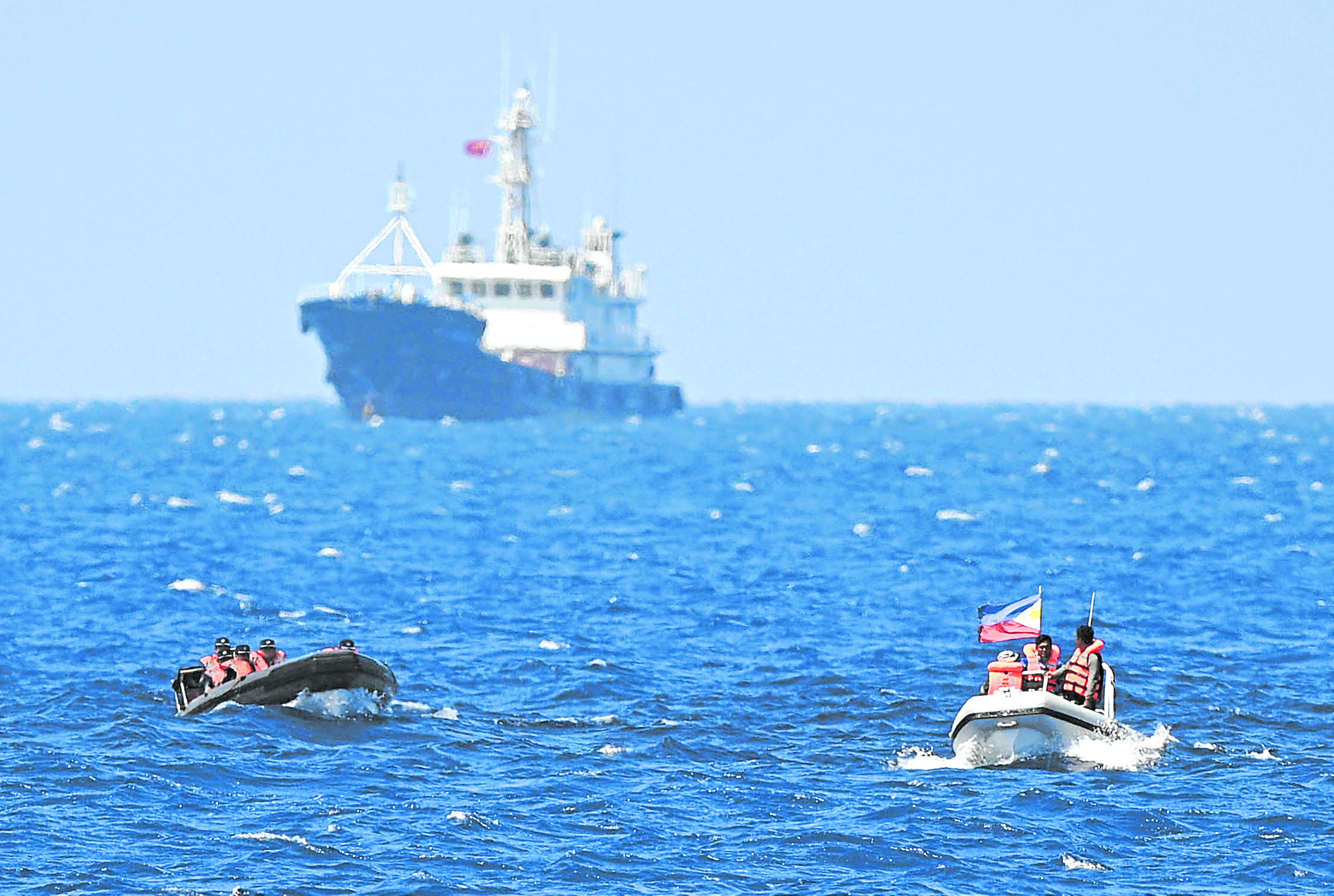DFA questions disclosure of WPS talk details

HOUNDED AT SEA China Coast Guard personnel aboard their rigid hull inflatable boat (left), in this photo taken on Feb. 16, trails a small Philippine boat carrying Bureau of Fisheries and Aquatic Resources personnel from the BRP Datu Tamblot trying to enter Scarborough Shoal, as a larger Chinese vessel is seen in the West Philippine Sea. —AFP
The Department of Foreign Affairs (DFA) on Tuesday chided the Chinese Embassy for disclosing details of “confidential” negotiations on the West Philippine Sea (WPS) dispute.
The DFA was reacting to a report from another newspaper quoting an unnamed “ranking Chinese official” who complained that China’s proposals to “manage” the dispute were “met with some kind of inaction” by the Philippine government.
“From the outset, the DFA wishes to underscore that the Philippines is approaching these confidential negotiations with utmost sincerity and good faith,” the DFA said in a statement on Tuesday.
“We were, therefore, surprised by China’s disclosure of sensitive details of our bilateral discussions,” it stressed.
The DFA said China submitted last year “various maritime-related proposals,” which were seriously discussed and considered by concerned Philippine government agencies and by the DFA.
Article continues after this advertisementHowever, most of the proposals went against the Philippines’ national interest, it said.
Article continues after this advertisement“In no way did the Philippine government ignore China’s proposals,” the DFA pointed out.
‘Contrary to national interest’
The DFA also said a proposal was raised by Chinese Vice Foreign Minister Sun Weidong in March last year referring to a so-called “gentleman’s agreement.”
Under that proposal, “China insisted on actions that would be deemed as acquiescence or recognition of China’s control and administration over the Ayungin Shoal as China’s territory,” the DFA noted.
“As Ayungin Shoal is a part of the exclusive economic zone of the Philippines, the proposal of China could not be considered by the Philippines without violating the Philippine Constitution or international law,” the DFA stressed.
It said “a few proposals were deemed somewhat workable [but] many of the remaining Chinese proposals were determined, after careful study, scrutiny and deliberation within the Philippine government, to be contrary to our national interests.’”
Any agreement or understanding to be reached with any foreign government “should not only be in accordance with our mutual interests, but should also not undermine the Philippine Constitution or denigrate the legally settled rights of the Philippines under international law, particularly the 1982 Unclos and the 2016 arbitral award,” the DFA said.
It was referring to the United Nations Convention on the Law of the Sea and the July 12, 2016, decision of the Permanent Court of Arbitration in The Hague on the Philippines’ case against China in the South China Sea invalidating Beijing’s claims, including its nine-dash line, recent land reclamation activities, and other activities in Philippine waters.
Mutual commitment
The DFA said the Philippine government submitted counterproposals last year, but instead of considering them, “the Chinese side presented its own counterproposals, which again did not reflect our interests, especially on issues such as the South China Sea.”
The DFA said the problems were further discussed in person during the 8th bilateral consultation mechanism (BCM) meeting on the South China Sea held in Shanghai last Jan. 17.
In its statement on the outcome of the latest BCM, the DFA said “both sides presented their respective positions on the Ayungin Shoal and assured each other of their mutual commitment to avoid escalation of tensions.”
According to the DFA, the Philippines and China agreed during that meeting to “improve maritime communication mechanisms in the South China Sea” and to initiate talks on possible academic exchanges on marine scientific research between Filipino and Chinese scientists.
During the media briefing last Friday, the Chinese Embassy official said Beijing had submitted several concept papers to establish rules on how to manage the maritime disputes with the Philippines, but these proposals fell on deaf ears.
READ: PH and China coast guard ships collide in West Philippine Sea
“We provided 11 concept papers, one initiative on how to manage Second Thomas Shoal; one concept paper on how to manage the fishing issue and the Scarborough Shoal; [and] another on ecological protection,” the official said.
However, there seemed to be an “inaction on the part of the Philippines” as they have not gotten feedback since the papers were submitted around April last year, the official added. —WITH A REPORT FROM JANE BAUTISTA
For comprehensive coverage, in-depth analysis, visit our special page for West Philippine Sea updates. Stay informed with articles, videos, and expert opinions.